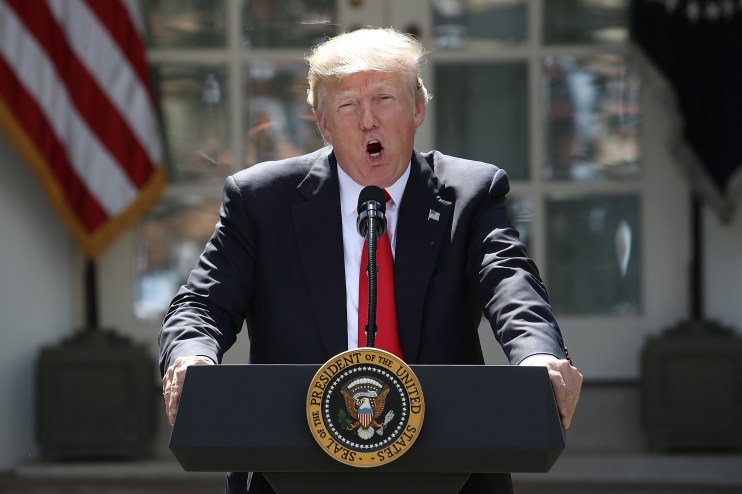Trump’s troop withdrawal will put Syrian Kurds in danger

Not many people would cite President Donald Trump as an example of reasoned and level-headed foreign policy making.
With fingers permanently hovering over his Twitter interface, the leader of the free world has at times been closer to initiating global conflict through his incendiary language than pouring oil over troubled waters.
Despite this – or maybe because of it, given the “madman” theory that Trump’s unpredictability encourages compliance from friends and foes confused about his intentions – US international policy has been fairly successful under his watch.
Whether with Iran, North Korea, or China, Trump’s no-nonsense approach has reminded international malefactors that the starry-eyed idealism of the Obama years has been replaced by a hard-headed realism that demands attention.
One of Trump’s finest foreign policy moments was the driving of Isis from Iraq and Syria. It was the culmination of an allied effort years in the making, but delivered at pace because of Trumpian cajoling.
This achievement does, however, now look to have been placed somewhat in peril by the President’s erratic pronouncements this week.
In a case that should concern all US allies, Trump greenlit a Turkish plan to set up a safe-zone corridor in the north east of Syria by stating that US border forces would be withdrawn shortly because he had been elected on “getting out of these ridiculous endless wars”. But once it was pointed out to him that Turkish plans might include the settling of scores with Syrian Kurds who were integral in the anti-Isis coalition, he threatened to “destroy and obliterate” Turkey’s economy should the Turks attempt anything that Trump – in his “great and unmatched wisdom” – considered to be “off limits”.
As an example of wisdom, this is hardly that of King Solomon. Seeing as both the Kurds and the Turks are – at the very least – nominal US allies, with the Kurds having fought alongside US forces in Syria and Turkey being a Nato partner, this confused approach risks splintering allied confidence in US intentions, as well as threatening the hard-fought peace in northeast Syria.
It is not difficult to see why Turkey might want to create a zone of control just over its border with Syria.
The country plays host to more than 3.6m Syrian refugees who fled the butchery of Bashar al-Assad’s regime and the murderous intentions of Isis. President Erdogan would quite like to decant most of them back over the border from whence they came. A Syrian land grab would enable this to be accomplished in a territorially contiguous fashion, while also guaranteeing the safety of the refugees from vengeful Assadist hands.
But Turkey has a secondary motivation that is more troubling. The military power in northeast Syria – the Syrian Democratic Forces (SDF) – is largely comprised of Kurdish militias. The largest of these is the YPG, which Turkey believes is allied to the terrorist Kurdistan Workers’ Party (PKK), which has fought for Kurdish autonomy within Turkey since the 1980s. The YPG certainly has connections with the PKK – even if these are not recognised formally by Western countries through its proscription – and it might therefore suit Turkey to drive further into Syria than it has declared it would, in order to uproot what it regards as an enemy.
Except that this enemy also turns out to have been the West’s staunchest ally in a different battle: the removal of Isis from the region. Kurdish forces held the line against marauding Isis forces when the putative Caliphate was at its greatest zenith. It was these same militias who provided the muscle – alongside a contribution from various allied powers – to drive Isis out in the most recent military campaign.
Nor is the Kurdish role in suppressing Isis purely historical. Thousands of Isis fighters remain in Kurdish-run prisons today, guarded by Kurdish forces.
The SDF have already declared that if a US troop withdrawal leads to a Turkish assault against their positions, then not only would there be moral outrage over the abandonment of an ally, but their forces would have to focus on defending Kurdish positions. This would run the risk of an Isis prison break and the reinvigoration of its cause.
The Kurds may also have to seek the protection of Assad, strengthening his bloody grip on the country – and that of his backers: Russia and Iran.
A greater strategic own goal for American interests would be harder to envision. Particularly as Trump’s blistering language following his initial announcement will have destroyed any goodwill he might have obtained from Turkey.
The irony is that this hornets’ nest need not have been stirred. There are only approximately 1,000 US troops across Syria. This is a small military price to pay to maintain peace in a war-torn region, particularly as US forces are not involved in combat operations currently.
Trump has quietly backtracked from Syrian troop withdrawals before. For the sake of alliance relations, and in order to preserve his historic destruction of Isis’s physical power, he should do so again. Lest we all pay the price with the return of the jihadists.
Main image credit: Getty